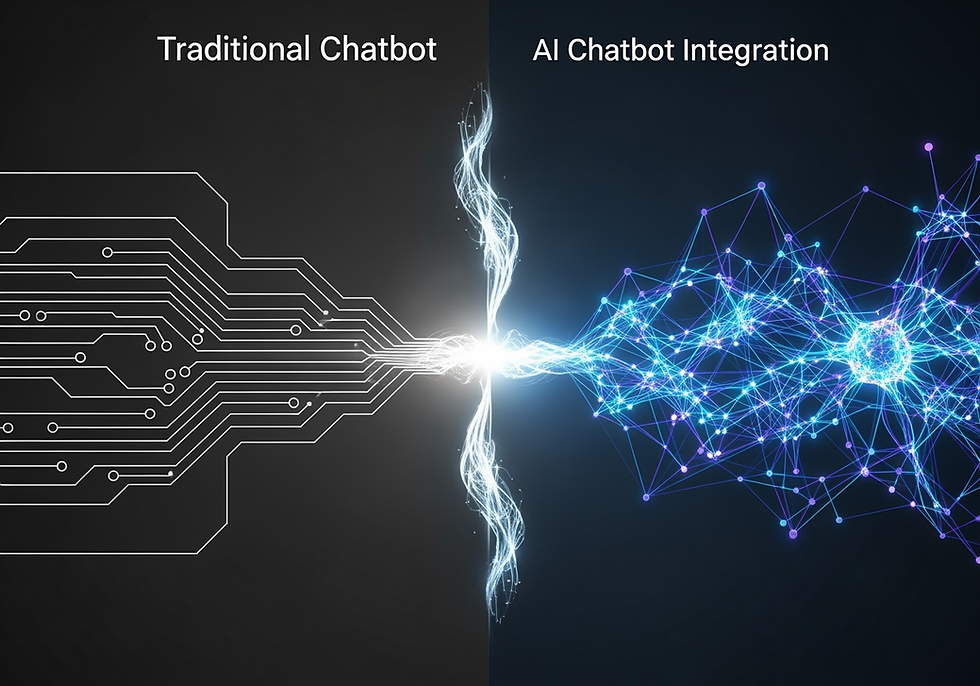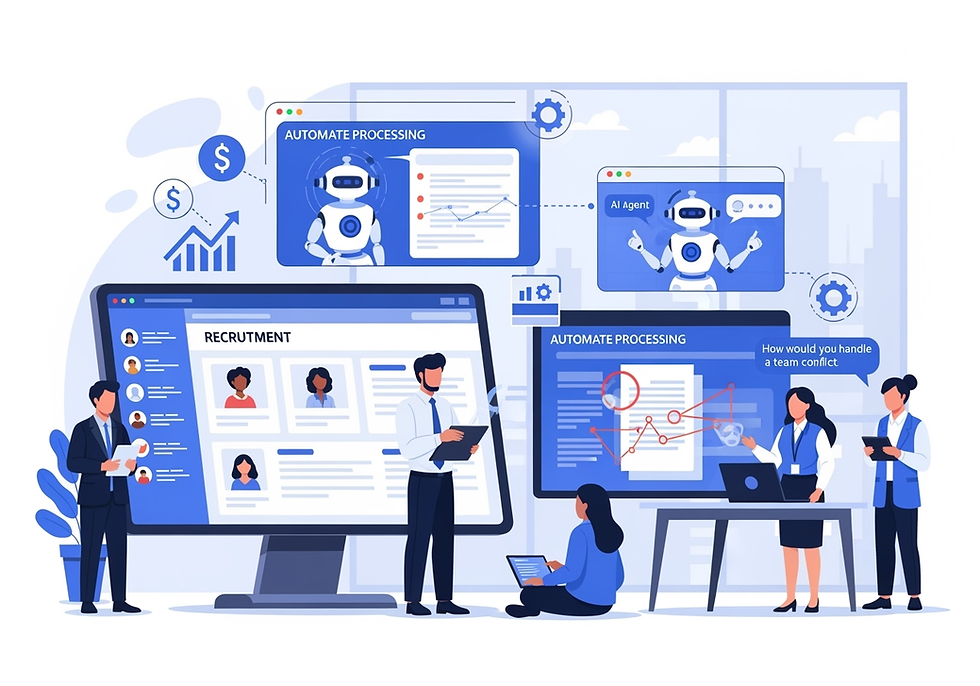AI Agents vs. Traditional Chatbots: What Growing Businesses Need to Know
- Shreya
- Sep 10, 2025
- 4 min read
Over the past decade, conversational technology has transformed how businesses communicate with their customers. From the early days of rule-based chatbots to today’s AI-driven conversational agents, the shift has been nothing short of revolutionary. For growing businesses in the UK, the choice between traditional chatbots and AI agents is becoming increasingly important. Selecting the right solution impacts customer experience, operational efficiency, and overall growth potential.
This article explores the differences between the two technologies, helping decision-makers understand which option aligns best with their long-term strategy.

Defining Traditional Chatbots: Rule-Based Assistants
Traditional chatbots are often referred to as rule-based systems. They operate on predefined scripts and can only handle queries for which they have been programmed. If a customer asks a question outside of the chatbot’s programmed pathways, the system either fails to respond effectively or redirects to a human agent.
Key features of traditional chatbots:
Operate based on pre-set rules and decision trees.
Provide quick responses to simple, repetitive questions.
Limited ability to understand context or nuance.
Cost-effective for businesses with basic customer support needs.
While these chatbots can handle FAQs and straightforward tasks, they lack the intelligence and adaptability required to deal with complex customer interactions.
What Are AI Agents? Intelligent, Adaptive, and Context-Aware
AI agents represent the next stage in conversational technology. Unlike rule-based bots, AI agents are powered by machine learning, natural language processing (NLP), and contextual understanding. This allows them to not only respond accurately but also learn from each interaction, improving their performance over time.
Key features of AI agents:
Understand intent, sentiment, and context in conversations.
Capable of holding natural, human-like discussions.
Can be trained on company-specific data to provide tailored responses.
Continuously improve through machine learning algorithms.
Able to integrate across multiple business systems (CRM, ERP, helpdesk).
For growing businesses, AI agents act more like digital employees rather than simple tools, providing proactive and intelligent support.
Core Differences: Static Scripts vs. Learning Systems
The most significant difference between chatbots and AI agents lies in how they process and adapt to conversations.
Traditional Chatbots:
Follow static scripts.
Struggle with unexpected queries.
Cannot adapt without manual reprogramming.
AI Agents:
Learn and adapt through data.
Can understand user intent beyond exact keywords.
Deliver personalised, contextual responses.
In essence, traditional chatbots are reactive, while AI agents are adaptive and proactive.
User Experience: Transactional Conversations vs. Human-Like Interactions
Customer expectations in the UK are higher than ever. People no longer want robotic, generic responses; they expect personalised, efficient, and empathetic communication.
With Chatbots: The experience often feels transactional. They are efficient at answering “what are your opening hours?” or “where is my order?” but quickly fall short when customers ask for more nuanced assistance.
With AI Agents: The experience feels more natural. AI agents can recognise tone, provide detailed answers, escalate appropriately, and even anticipate customer needs. This creates stronger customer satisfaction and loyalty.
For businesses looking to scale, the difference in customer experience can have a measurable impact on retention and revenue.
Scalability and Efficiency: Which Model Supports Growth Better?
As businesses grow, so does the volume and complexity of customer interactions.
Traditional Chatbots: While cost-effective in the short term, they require continuous manual updates to handle new queries, which becomes resource-intensive.
AI Agents: They scale naturally as they learn from customer interactions. Once integrated with business systems, they can handle thousands of conversations simultaneously without additional manpower.
For growing businesses that anticipate rapid expansion, AI agents provide the flexibility and efficiency needed to support long-term scalability.
Integration Capabilities: From Simple Tasks to Complex Workflows
Another key area of difference lies in integration.
Traditional Chatbots: Usually limited to answering FAQs or integrating with a single platform (e.g., Facebook Messenger).
AI Agents: Can connect seamlessly across multiple systems including CRM software, e-commerce platforms, HR systems, and marketing automation tools. They can check stock availability, process payments, schedule appointments, or update customer records in real time.
For businesses investing in digital transformation, AI agents offer a clear advantage by becoming a central part of operations rather than a standalone tool.
Cost Implications: Short-Term Savings vs. Long-Term Value
When comparing chatbots and AI agents, cost is often a major factor for decision-makers.
Chatbots: Low setup costs make them attractive to small businesses. However, the long-term maintenance, manual updates, and lack of scalability can lead to hidden costs.
AI Agents: The initial investment may be higher, but the return on investment is significant. They reduce the need for large customer service teams, enhance operational efficiency, and improve customer satisfaction—directly impacting revenue.
For growing businesses, AI agents provide greater long-term value than traditional chatbots.
Future Outlook: Where Conversational AI Is Heading
The future of customer communication is undeniably leaning towards AI-driven systems. Advancements in generative AI, predictive analytics, and voice technology mean AI agents will become even more human-like and proactive.
Businesses in the UK that adopt AI agents early position themselves ahead of competitors. As customers increasingly expect seamless digital experiences, companies that still rely solely on traditional chatbots may struggle to meet evolving demands.
Choosing the Right Solution for Your Business Growth
Both traditional chatbots and AI agents have their place in business operations. Chatbots are suitable for very small businesses with limited requirements. However, for growing businesses in the UK looking to scale, AI agents are the superior choice.
They not only handle customer interactions more effectively but also integrate with existing systems, provide better customer experiences, and deliver long-term cost savings. Investing in AI agents is essentially investing in the future of your business.
Elevate Your Business with Omnitech AI Agent Integration
At Omnitech Business Ltd, we specialise in helping UK businesses unlock the full potential of AI agent integration. Our AI solutions go beyond traditional chatbots, offering adaptive, intelligent, and scalable support that grows with your business.
Whether you want to enhance customer service, streamline workflows, or future-proof your operations, our AI Agent Integration services are designed to deliver measurable results.
👉 Ready to take the next step? Contact Omnitech Business Ltd today and discover how AI agents can transform your business.




Comments